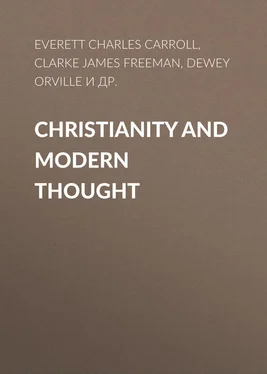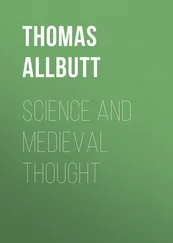Andrew Peabody - Christianity and Modern Thought
Здесь есть возможность читать онлайн «Andrew Peabody - Christianity and Modern Thought» — ознакомительный отрывок электронной книги совершенно бесплатно, а после прочтения отрывка купить полную версию. В некоторых случаях можно слушать аудио, скачать через торрент в формате fb2 и присутствует краткое содержание. Жанр: foreign_antique, foreign_prose, на английском языке. Описание произведения, (предисловие) а так же отзывы посетителей доступны на портале библиотеки ЛибКат.
- Название:Christianity and Modern Thought
- Автор:
- Жанр:
- Год:неизвестен
- ISBN:нет данных
- Рейтинг книги:5 / 5. Голосов: 1
-
Избранное:Добавить в избранное
- Отзывы:
-
Ваша оценка:
- 100
- 1
- 2
- 3
- 4
- 5
Christianity and Modern Thought: краткое содержание, описание и аннотация
Предлагаем к чтению аннотацию, описание, краткое содержание или предисловие (зависит от того, что написал сам автор книги «Christianity and Modern Thought»). Если вы не нашли необходимую информацию о книге — напишите в комментариях, мы постараемся отыскать её.
Christianity and Modern Thought — читать онлайн ознакомительный отрывок
Ниже представлен текст книги, разбитый по страницам. Система сохранения места последней прочитанной страницы, позволяет с удобством читать онлайн бесплатно книгу «Christianity and Modern Thought», без необходимости каждый раз заново искать на чём Вы остановились. Поставьте закладку, и сможете в любой момент перейти на страницу, на которой закончили чтение.
Интервал:
Закладка:
Perhaps I may give here an illustration that will make you understand me. I was in a house made of branches of trees, where lived a sheik. He told me that every thing in that house, his own person, his own family, were mine; and he said this with the greatest protestations. This is exactly the same as if you should say to a foreigner, coming into your house, "You are welcome." Nothing more. If, on going away, I had taken any thing from that house, the man would immediately have shot me; though he had given me every thing, even to his own person and his own family; because he would have had this idea: "This man is a thief; I have a thief in my house." If I had said, "But you gave me every thing in the house," he would have answered me, "You come from a country where people have no politeness. I gave you these things: that means welcome , and nothing more." Thus a man of the Orient never says any thing in the simple short way that Western nations do: they always want some poetry, some rhetoric, some image about it. And you must remember that many of the most admirable teachings of the Bible are in images, are in poetry, and are extremely beautiful and eloquent by their poetry. We are accustomed to this, so that we know that it is poetry; and we understand it. But the Romans, accustomed to their principle, that the law may be hard, but that law is law, and must be understood literally, and executed literally, understood every thing literally, and in that way they spoiled many of the great Christian truths. I will not here quote many instances, though it would be exceedingly easy to bring them in large numbers before you. I will take the most striking and best known of all. When our Lord, a few hours before being separated from his disciples, to die on the cross, gave them of the bread that was on the table, and said, "Eat, this is my body," it was absolutely impossible for Eastern people to misunderstand him; it was impossible for them not to understand that he meant, "This represents my body." The idea that what he held in the hands of his own body was his own body again; that he gave them his own body to eat, and that he ate some of it himself with them, – that idea could not for a moment have entered the head of one of those who were there. And if a multitude had been there, instead of the twelve Apostles, it would have been exactly the same. Nobody would have understood, when the Lord said, "I am the way," or when he said, "I am the door," that he was really, in fact, a path or a gate; everybody knew that he meant, "I am the leader; you must come with me; I show you the way." Everybody in the Orient understood that. But here comes the Roman genius, taking every thing literally; and they repeat, "He said, 'This is my body,' and this is his body." They repeat: "You Protestants do not accept the truth coming from the lips of your Master. He says, 'This is my body,' but you Protestants say, 'No, it is not his body, it represents his body.'" Thus it seems we are convicted of crime; it seems we will not accept the teachings of our Lord; yet we are perfectly true to his own meaning, to his real meaning, that could not be misunderstood in the East, but that was misunderstood when it was carried to Rome, a country where people gloried in taking every thing in a literal sense. So they did with many other most beautiful and delicate things in the Bible. The Roman genius – I cannot help saying it – had something clumsy in it. They were like giants, having very strong arms, and enormous hands, to take every thing, and to dominate over every thing. But any thing very delicate, very poetic, like flowers from the East, they could not touch without the flowers being broken and faded, losing their charm and their color. That was their way of treating many of the most beautiful things of the Bible, which they did not understand; which they made absurd or repulsive, by taking in a literal sense what was said, and ought to be taken, in a spiritual sense. They acted exactly as we should, if we received an Oriental letter and understood as literal every thing contained in it.
I will give another instance to make this clear. I remember having seen two letters, written one by a French General, and another by Abd-el-Kader, the chief of the enemies of the French in Algeria. These letters were intended to convey identically the same thing; that is to say, that some prisoners on one side were to be exchanged for the same number of prisoners on the other side. It had been decided that the French General and the Arab chief should say the same thing. I have seen both. The French General writes two lines; very clear, distinct, and polite, with nothing but the exact meaning he wanted to convey. But Abd-el-Kader, meaning to write the same thing, writes a whole page, about flowers, and jewels, and roses, and moonshine, and every thing of the kind. His intention was to say exactly the same thing, to convey identically the same meaning; but these things, translated from one language to another, pass, as a celebrated German scholar says, "from the Shemitic to the Japhetic; from the poetic language of the sons of Shem, to the precise language of the sons of Japhet." This has been the fault of the Roman Catholic Church in many dogmas, in many points of very high importance: the sons of Japhet could not understand what the sons of Shem meant. They thought they understood it, when they were entirely in error, and gave to it a meaning altogether different from what was intended.
I must add, that what helped them along in this belief of things, taken in a literal sense, was Roman superstition. In that town, and in Italy, have always prevailed the strangest superstitions. The most celebrated Romans, men whose wisdom and whose glory have filled the world, if they met, when they went out of their house in the morning, a hare in the way, re-entered their house on the instant, and renounced any thing they had to do, because meeting a hare was ominous of misfortune, and any thing they should undertake that day would result in their confusion or misfortune. When they put their foot in the wrong way, the left before the right, or the right before the left, on the stone at the entrance of a house, they stopped there and returned to their house, because every thing they should do in that house would prove unfortunate, since they had made a mistake in putting the wrong foot foremost when they entered the house.
So there were a multitude of superstitions. You know when they were to decide the greatest questions of peace or war, they consulted their sacred chickens. They gave them grains of wheat, and if the chickens ate it, or if they refused to eat it, or if they ate it too fast, or if the chickens let fall a grain of wheat from their mouths, – these signs meant that war would be successful, or that it would not be, and they decided according to these whether there should be a war or not. And those great magistrates, who were sometimes men of the greatest eminence, like Cicero, were augurs. You know what Cicero says, "Two of us cannot meet without laughing;" because they knew that their auguries were utterly worthless, but the multitude thought they were true. So the Romans were superstitious to the highest degree, and they have never ceased to be so. There is superstition in the marrow of their bones. Many Romans are ready to believe any thing to-day, at the present moment. I shall allude to a single fact. They all believe devoutly in the evil eye; that there are people who, if they look at you, will bring upon you some horrible misfortune, disease, or death. They believe this so fully, that they have a gesture, representing with their fingers a pair of horns; and, when they meet any one who is supposed to have the evil eye, they endeavor, in a secret way, to make that sign, to prevent misfortune from coming upon them. It is believed, in Rome, that the present pope, who is to them God on earth, who is to them the successor and vicar of Jesus Christ, that he, as a man, has the evil eye. And when he passes through the streets of Rome, a great many women, devoutly kneeling before him, with their heads almost in the dust, craving to receive his blessing, as he passes in his carriage, will, under their aprons, make this sign, to preserve themselves from the effects of the evil eye. This is no disparagement to his person; they think that the poor man cannot help it; that there is no ill will in it; that it is fate; he has the evil eye.
Читать дальшеИнтервал:
Закладка:
Похожие книги на «Christianity and Modern Thought»
Представляем Вашему вниманию похожие книги на «Christianity and Modern Thought» списком для выбора. Мы отобрали схожую по названию и смыслу литературу в надежде предоставить читателям больше вариантов отыскать новые, интересные, ещё непрочитанные произведения.
Обсуждение, отзывы о книге «Christianity and Modern Thought» и просто собственные мнения читателей. Оставьте ваши комментарии, напишите, что Вы думаете о произведении, его смысле или главных героях. Укажите что конкретно понравилось, а что нет, и почему Вы так считаете.












